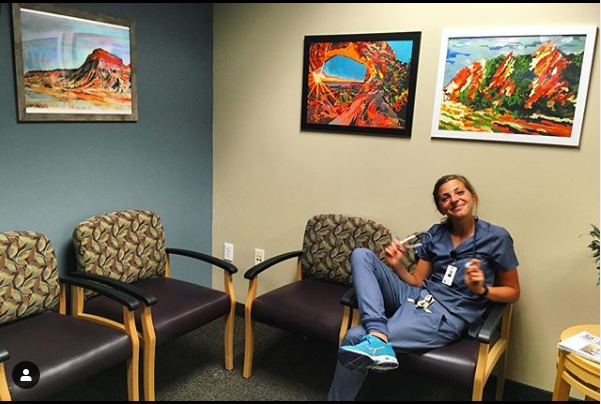
Big life update for everyone who has been reading my blog: I am no longer a float nurse. Recently, I was offered a permanent position in our system’s allergy and asthma department, and I accepted. I’ve shared the conflicting pros and cons of being a float nurse, and it is a bittersweet transition, but I think overall I am ready for a change. The office I will be working in is brand new, which is both exciting and frightening. I am spending this weekend preparing the office as much as I can: from unpacking boxes to sorting band-aids to ordering medications.
Two Passions Coming Together (sort of)
One of the most exciting parts of preparing the office has been finding art for the walls. I love to paint in my free time, and it worked out to hang nine of my paintings throughout the new office. I don’t think my art will ever be in a professional gallery, so this was basically the next best thing. I am psyched to be able to bring together my hobby and my nursing world just a bit.
As I contemplate the job transition, there are a lot of thoughts that come to my brain. Let’s start with my worries.
I am worried that I won’t be ready for upcoming emergencies. It isn’t common for outpatient settings to deal with high acuity patients, but the allergy and asthma world is an exception. This specialty is a field of medicine with a high risk of systemic reaction. My new office will be seeing primarily pediatric patients with severe food allergies. I will be doing many “food challenges,” which involve titrating out doses of food and seeing how the patient tolerates ingestion of the food. For example, a five-year-old may have been told at age two that he was allergic to cow’s milk, but his mother would like to reintroduce milk into his diet. Our office would be a safe, closely monitored place to try drinking the milk. I know how to monitor patients; I know how to properly dose emergency medication; I know the protocol to follow if the patient develops anaphylaxis signs. Intellectually, that is. It’s all head knowledge at this point, and I don’t know when I’ll have to implement it. I just have to trust my training and be alert.
I am also worried about being tied to one department. I have been floating between OB/GYN, orthopedics, pediatrics, family practice, and allergy for a year, and I am now committed to working solely in one discipline: what if I don’t like it as much as I thought I would? What if I miss a different department? Am I tying myself down by only working in one department? What if I lose the skills that I’ve gained by working in many different areas? These are all specific questions that have rattled around in my brain the past few weeks.
The Benefits of a New Job
To be honest, though, the benefits of taking this position have outweighed the worries of leaving the float pool. After concentrating on widening the breadth of my nursing skills, I will change modes and develop depth in one specific area. Not only will I be building a comprehensive knowledge base for myself, but I will soon be able to educate my patients on their conditions and how to best manage their conditions for optimal quality of life. I am also excited to form long term relationships with patients. In no time, I will be recognizing patients coming in for their weekly allergy shots or a one-month follow-up office visit. I get to be a part of creating a healthy office culture where patients feel welcome.
Overall feelings summary: preparing this allergy office is a daunting task. But I am excited.
Since I’m in the process of switching jobs, I am hyper-aware of others in my workplace who are experiencing job transition. My supervisor will be retiring in September; one of the family practice doctors is moving to Michigan; a fellow nurse put in her two-week notice today. All three of these examples are different transitions from mine, yet all stem from very relatable life circumstances and personal motivations.
My supervisor has been working in her position for over 30 years. She has managed all manner of healthcare issues, ranging from interpersonal tensions to technology malfunctions to legal cases. She is well-loved by all who work underneath her in the workplace hierarchy, which is a testament to her high quality of leadership. In one of our conversations, though, she confessed that she was ready for retirement: “After a while, Morgan…the medical world wears on you.” She said this with a longing in her voice, a longing to pass the torch on to someone else.
Just starting out in the medical world, it’s hard for me to truly understand the years of work that she has lived through (mostly because she has been working longer than I’ve been alive). I admire her, though, and I am honored to have been able to witness her dedication to delivering quality care for patients even after decades of work.
The second co-worker in the midst of job transition is one of our family practice doctors, who is heading back to Michigan. This doctor has worked hard to establish a patient base in Colorado, but now family demands are driving the move back to her home state. From her situation, I see that career trajectory does not always need to take first place in one’s life: personal values such as family can take precedence over job responsibilities. As this doctor prepares to head to Michigan, both her patients and her coworkers mourn the loss of such a caring individual from the practice.
The third and final coworker who is leaving the practice is a fellow nurse, off to explore a new job in the area. She felt like she was getting “bored” with her daily responsibilities and yearned for a different job that aligned better with her gifts and interests. In a few weeks, she will be launching a start-up telehealth project (a topic I would love to explore in a coming blog).
Thinking about my coworkers’ transitions as well as mine, I can’t help come to the conclusion that job transition is a very natural part of life. In a previous blog, I discussed how rampant discontent, burnout, and turnover are in the medical field. What I failed to say, though, is that job change can be good as well. Retirement can facilitate rest; physically moving to a different location can help foster personal values like family; accepting a new position can stimulate renewed interest and promote satisfaction.
I suppose the emphasis of the career shift is different: moving towards something life-giving rather than away from something life-sucking.
I’m not sure what the coming months will look like as I adopt my new position, but I will be sure to mention a tidbit here and there about how it is going!









Write a comment: